
Clive Bull 1am - 4am
13 January 2021, 08:22

Zoos are being warned to take extra care to protect primates after several gorillas tested positive for coronavirus in San Diego.
The gorillas are believed to be the first known cases of Covid-19 among great apes.
Other wildlife, including minks and tigers, have previously contracted the virus.
READ MORE: London leaders demand urgent tougher Covid measures
READ MORE: Half of ICU staff 'suffering from PTSD and problem drinking' amid Covid crisis
They tested positive at San Diego Zoo after some were seen coughing.
The infection is thought to have come from a member of staff who tested positive despite being asymptomatic, and who wore a mask at all times when close to the primates.
The likelihood of the gorillas developing a serious reaction is not yet known, but gorillas share some 98 per cent of their DNA with humans, with other primates sharing still more.
This makes them vulnerable to human infections, with even the common cold potentially fatal.

Police Commissioner tells LBC officers are dealing with 'idiotic behaviour'
The outbreak has prompted warnings for all zoos and conservation reserves to rethink their pandemic biosecurity measures.
"It's now clear that, despite all the precautions, there can be spread," Professor Serge Wich, a primate expert at Liverpool John Moores University, said.
"So we might need to rethink a little bit about where we can improve upon these precautions and really try to understand why this particular transmission did happen.
Prof Wich was one of 25 experts to sign a letter in March calling for the closure of national conservation parks in Africa and Asia to protect great apes in the wild, already under pressure from illegal poaching and habitat loss.
He said the San Diego case showed the coronavirus to be a "huge concern" for zoos and reserves, and for people who conduct research on primates and who work in tourism, even when they did "maintain a distance and take precautions".